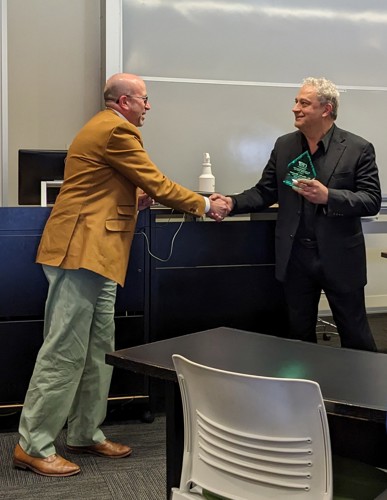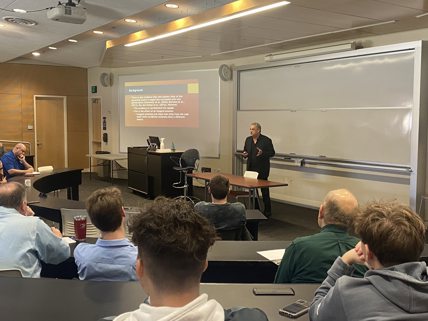 Emotions control so many decisions in our everyday lives. From simple daily tasks to decisions which could potentially be life-changing, emotions often determine what our next step will be.
Emotions control so many decisions in our everyday lives. From simple daily tasks to decisions which could potentially be life-changing, emotions often determine what our next step will be.
While emotions can play a role in how you perform on an exam, they also play a significant role in economic decision-making. Whether it’s happiness or fear, Dr. Charles Noussair is using research and experiments to find out how individuals deal with risky decisions and solve problems.
Noussair, Eller Professor of Economics at the University of Arizona, presented “Emotions and Economic Behavior” in the Romain College of Business at the University of Southern Indiana on Friday, March 17 in front of a full house of students, faculty and administrators. The presentation was made possible by the generous support of Berger Wealth Services at Baird Private Wealth Management and the USI Foundation.
“Traditionally in economics, we don’t really think about emotions. It’s typically been in the realm of psychology,” Noussair said. “But they really do affect economic decision-making. It really matters what type of emotional state you’re in.”
Noussair’s presentation focused on different research techniques, the technologies used to study emotions and how emotional state can be a determining factor in decision-making. He placed an emphasis on different studies used in relation to the stock market and how there's correlational evidence of the relation between mood and markets.
A conclusion he was able to draw is that emotional state is a result, not a cause, of market pricing patterns. But what he wants students to understand from these lessons is that economics is much more than just numbers and charts.
“Economics is not all about measuring interest rates, studying bank runs or wondering if the GDP in Indiana is going to go up or down next year,” Noussair said. “It’s so much broader than that.”
Noussair also went over experiments that displayed the role emotions played in test-taking. Research participants were shown videos meant to induce happiness, fear or neutrality. Through the results, he was able to determine that emotional state is a determinant of productivity and academic performance.
 It’s why he hopes students learn that emotions control many different outcomes sooner rather than later.
It’s why he hopes students learn that emotions control many different outcomes sooner rather than later.
“You want to manage your own emotional state if you're going to want to do better at work, do better at school and have a life less stressed,” Noussair said. “There’s a lot of life lessons in this.”
Noussair was recently appointed President of the Economic Science Association (ESA), a well-known international society for experimental economics. In addition to his role at the University of Arizona, he also is a senior extramural fellow for CentER at Tilburg University.
He earned his bachelor’s degree in economics and psychology from the University of Pennsylvania and his master’s and doctorate degrees in social science from the California Institute of Technology.